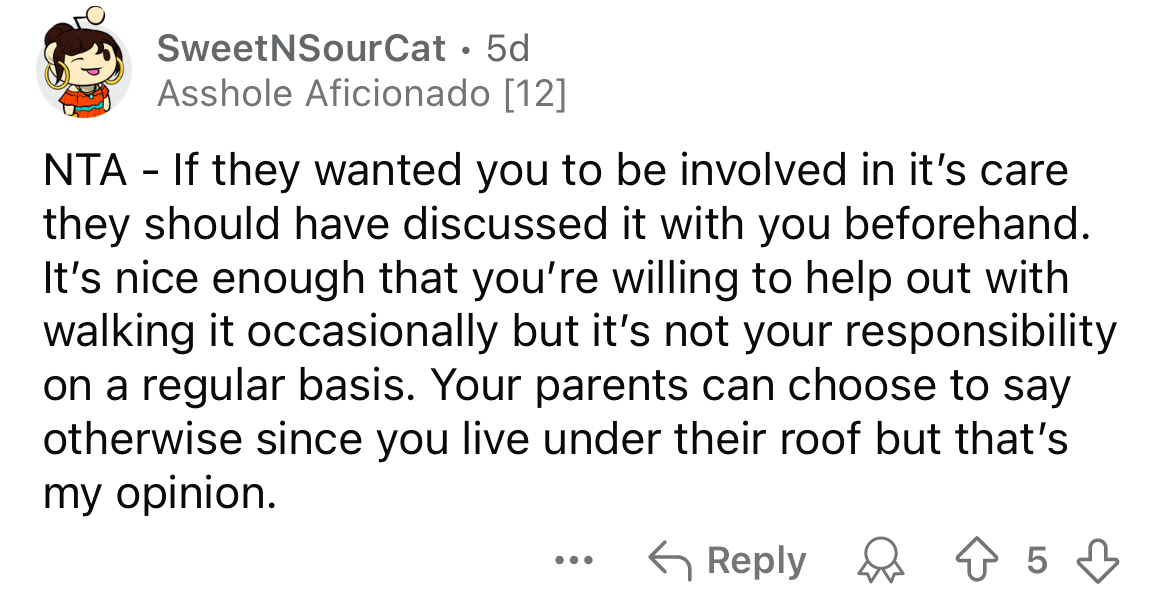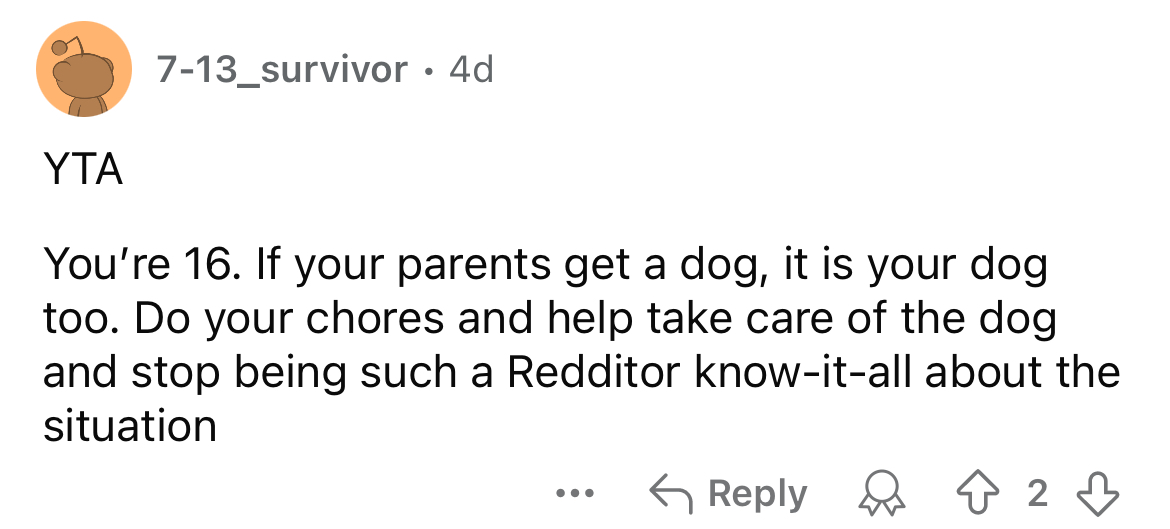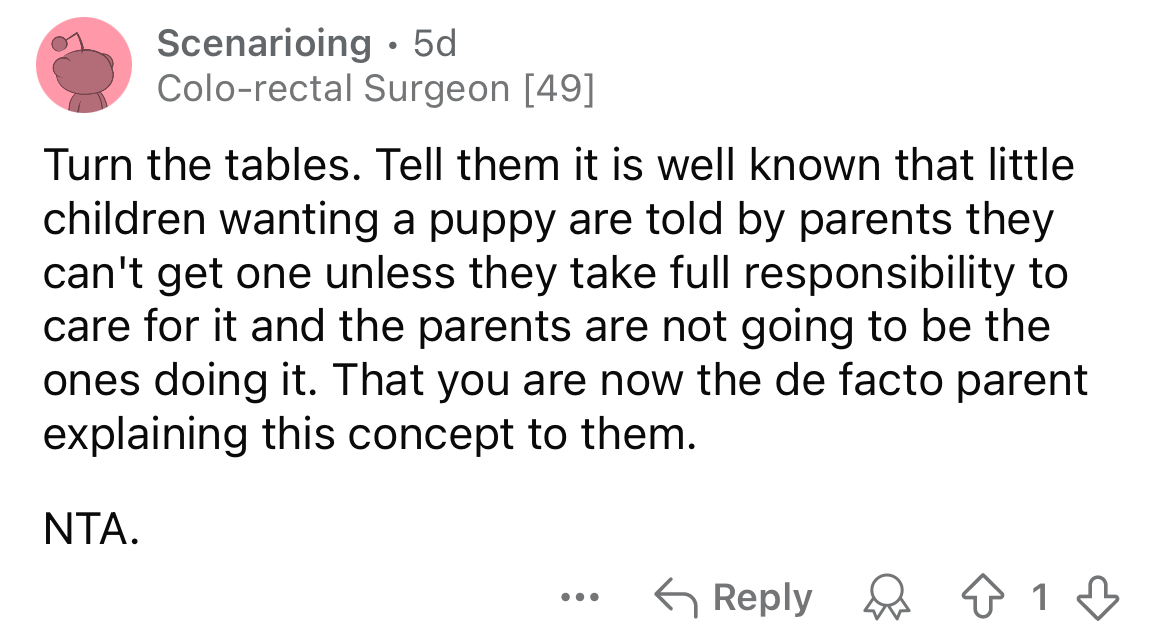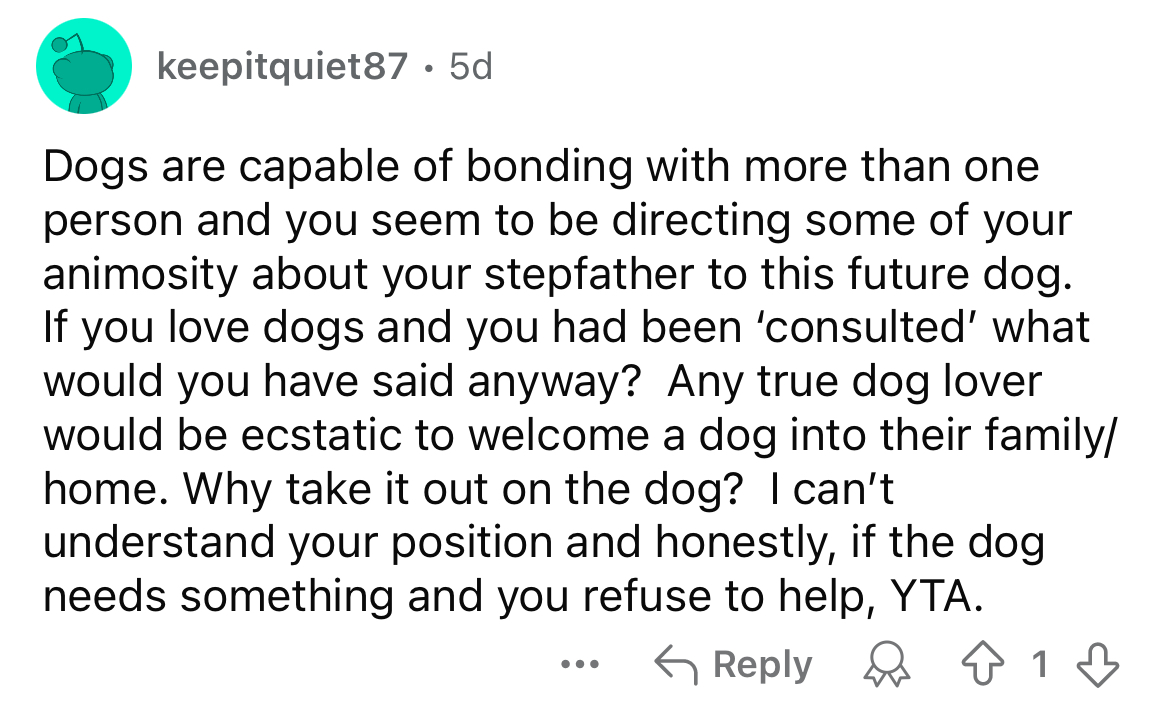Redditor Asks If He's an A**hole for Refusing to Help Take Care of Family's New Puppy
There aren't many (if any) things cuter than a puppy. The pure joy an adorable ball of fluff can bring to a family is immeasurable.
However, for one Reddit user, the news that his family was getting a pup wasn't as exciting as one might expect. Reddit user u/Burritomuncher2 recently shared his story in the r/AITA (Am I The A**hole?) subreddit.
He explained that his family recently got a new puppy. However, the 16-year-old wasn't happy about the new addition or the fact that he wasn't consulted about the decision beforehand.
The OP states he isn't prepared to take any responsibility for the dog because it doesn't belong to him. He told his family in no uncertain terms that he would not be walking, feeding, or taking care of the dog in any way.
The Redditor mentions that although he might help out occasionally, it's not his job to look after the pup because it isn't attached to him, and he's not the owner. He asserts that he never wanted the dog, so he shouldn't be expected to take care of it.
The OP continued by saying he might walk the dog sometimes, but he will not care for it or accept any of the burdens that come with owning a dog.
The Redditor's family was upset with him for stating that he wanted no part in caring for the new pup, and the OP acknowledges that he should probably help out since he still lives at home, but he isn't interested in being a dog owner.
Now the Redditor is wondering if he's the a**hole here. Keep scrolling to see how people reacted.
The Redditor asked if he's an a**hole for not wanting to take care of his family's dog.

He explained that his family recently got a new puppy.

Understanding Reluctance to Engage in Caregiving
The reluctance to assist with a new family puppy often reflects deeper psychological themes, including fear of commitment and responsibility.
Research demonstrates that individuals with avoidant attachment styles may struggle with caregiving, as they often feel overwhelmed by the demands of emotional investment.
According to studies in developmental psychology, early experiences influence how individuals approach relationships and responsibilities, shaping their willingness to engage in caregiving roles.
However, the 16-year-old wasn't happy about the new addition or the fact that he wasn't consulted about the decision beforehand.

The OP says he isn't prepared to take any of the responsibility for the dog because it doesn't belong to him.

From a behavioral perspective, the fear of being perceived as inadequate or overwhelmed can further deter individuals from participating in pet care.
Research shows that when individuals anticipate negative evaluations from others, they may withdraw from situations that evoke anxiety, such as caring for a new pet.
Encouraging open conversations about these fears can help alleviate pressure and foster a sense of support and understanding.
He told his family in no uncertain terms that he would not be walking, feeding, or taking care of the dog in any way.

He says he never wanted the dog, so he shouldn't be expected to take care of it.

The Role of Emotional Investment in Pet Care
Emotional investment plays a crucial role in how individuals perceive their responsibilities towards pets.
Research indicates that when individuals view pets as family members, they are more likely to engage in shared caregiving, which enhances emotional bonds.
Conversely, a detached view may lead to reluctance in taking on responsibilities, highlighting the importance of fostering emotional connections.
The OP continued by saying he might walk the dog sometimes, but he will not care for it or accept any of the burdens that go along with owning a dog.

The Redditor's family was upset with him for saying he wanted no part in caring for the new pup.

Additionally, understanding the motivations behind reluctance can be beneficial for family dynamics.
Research suggests that when family members discuss their feelings and concerns openly, it can enhance empathy and reduce misunderstandings.
Creating a culture of shared responsibility can lead to healthier family interactions and more effective caregiving practices.
The OP says he understands he should probably help out since he still lives at home, but he isn't interested in being a dog owner.

Now the Redditor is wondering if he's the a**hole here.

Ultimately, addressing reluctance to assist with pet care involves recognizing and validating individual concerns while promoting collaborative solutions.
Encouraging family discussions about the joys and challenges of pet ownership can foster a sense of unity and shared responsibility.
Such dialogues can help create a supportive environment where everyone feels empowered to contribute.
Here's how people reacted.

NTA.

What are your thoughts on this situation? Do you think the OP is being unfair for refusing to have any part in the dog's care, or is it fair enough, considering he never wanted the dog to begin with?
We would love to hear your opinions on this. You can share your thoughts with us in the comment section.
"They should have discussed it with you beforehand."

YTA.

"Theoretically, you're right."

"You might be a serial killer."

"Turn the tables."

Okay, but don't take it out on the dog.

Psychological Analysis
This situation reflects the complexities of emotional investment and responsibility in family dynamics.
From a psychological perspective, addressing these issues collaboratively can enhance understanding and cooperation among family members, facilitating healthier caregiving practices.
Analysis generated by AI
Analysis & Alternative Approaches
In conclusion, navigating caregiving responsibilities for a new puppy requires understanding and empathy from all family members.
By fostering open communication about feelings and concerns, families can create a more supportive environment for shared responsibilities.
Recognizing the emotional dynamics at play can lead to healthier relationships and more effective pet care.



